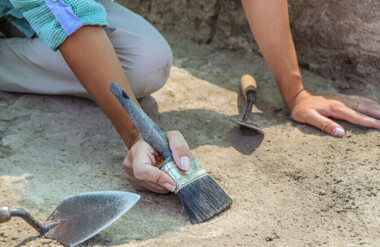Baghdad - Saba:
An archaeological expedition has uncovered evidence from Mesopotamia showing that bureaucracy has been an integral part of human life for thousands of years.
Archaeologists from the British Museum and the Iraqi State Board of Antiquities and Heritage unearthed more than 200 administrative tablets and 50 cylinder seals of Akkadian officials in the ancient Sumerian city of Karsu, one of the oldest cities in the world.
These discoveries, dating back more than four thousand years, reveal a complex governmental system that effectively managed state affairs, from land management to the distribution of goods and services. This demonstrates that administrative complexity is not a product of the modern era, but rather an ancient legacy that evolved with the development of civilizations.
The tablets date back to the archives of the ancient Sumerian city-state of Karsu, located in the Tell Tell region of Iraq, during the reign of the Akkadian dynasty between 2300 and 2150 BC.
Although these texts are not monumental literary works like the Epic of Gilgamesh, they are of great importance, as Sebastien Rey, director of the Krso Project and curator of Ancient Mesopotamia at the British Museum, explained to The Independent.
"These texts record all aspects of Sumerian life, naming real people and their occupations," Rey said. "The new tablets and seals provide tangible evidence of the life of a Sumerian city and its citizens under the rule of the Akkadian Empire, which lasted for about a century and a half before its fall."
Krso, known as one of the oldest cities in the world, was the sanctuary of the Sumerian hero god Ninurta or Ningirsu. At its peak, the city covered hundreds of hectares, but it was one of the independent Sumerian cities conquered by the Sumerian king Sargon of Akkad around 2300 BC.
The Akkadian dynasty originated from the city of Akkad, whose location is unknown but is believed to have been near modern-day Baghdad. The Akkadian Empire lasted for 150 years before ending in a revolt.
The administrative tablets, written in cuneiform script, contain records related to state administration, including matters relating to land management and the movement of goods and services. The records include accounts for various commodities, such as birds, fish, domestic animals, flour, and barley, as well as other goods such as bread, wool, and textiles.
Rey explained, "The names and occupations of the citizens of Karsu were recorded in lists. Sumerian cities were known for their complex bureaucracies. Evidence of imperial control includes the use of a new standard system called 'Akkad-gur' for flour and barley, similar to the British imperial system of measurement."
The tablets were found at the site of a large government archive building, built of mud brick and divided into rooms or offices.
Rey added, "We also found a collection of tablets containing architectural plans of buildings, fields, and canals. They were drawn by administrative survey scribes and are among the oldest known plans in the world."
These discoveries will be transferred to the Iraq Museum in Baghdad, with the possibility of loaning them to the British Museum in the future after further research and study.

| more of (International) |




